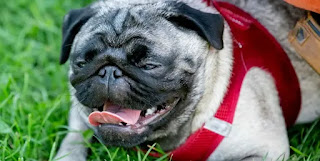Netherlands to ban flat-faced dogs, cats with folded ears due to ‘miserable’ health conditions
The Dutch National Government is proposing a ban on dogs with flat faces and cats with folded ears, as well as animals that suffer from serious health problems as a result of their appearance.
“We make life miserable for innocent animals solely because we think they are ‘beautiful’ and ‘cute,'” Dutch Agriculture Minister Piet Adema said last Friday in a statement.
Officials are working on a list of animals that could be banned in the Netherlands, as well as possibly prohibiting the sharing of images of these types of pets on social media in order to discourage the popularization of the breed due to its appealing appearance.
Pet owners who already have pets with flat faces or folded ears will be permitted to keep them until they die.
The specifics of the ban have yet to be determined, but Dutch government officials wanted to inform the public that a ban is on the way and that anyone considering purchasing a new pet should keep this in mind.
RELATED: Dr Jo Wilson Dies After Three-Year Battle With Dementia
Health issues with flat-faced dogs
According to Blue Cross, a national organization that promotes responsible pet ownership in the United Kingdom, dogs with flat faces are brachycephalic.
“Brachycephalic dogs have a muzzle that appears to be flattened or squashed inwards. Their lower jaw is disproportionately longer than their upper jaw, and the dog may appear to have a protruding lower jaw “According to the website.
French bulldogs, English bulldogs, Boston terriers, pugs, Cavalier King Charles spaniels, shih tzus, and boxers are common breeds for these types of pets.
While many dogs with shorter snouts are healthy, many more suffer from various conditions as a result of their cute appearance.
Many brachycephalic dogs have issues with breathing, heart health, teeth, skin and ear infections, and eye infections, and can have difficulty breeding. They may also experience neurological problems.
RELATED: How To Prepare Dogfish Lesser Spotted Catshark
A Royal Veterinary College (RVC) study published in 2020 discovered that flat-faced dogs are 1.3 times more likely than crossbreds to be diagnosed with at least one disorder in a single year.
Scottish Fold cats
FILE – A Scottish Fold Grey breed cat is judged on May 04, 2019, in London, England, at the LondonCats International Show and Expo at Tabacco Dock. (Getty Images/John Keeble)
According to the RSPCA in Australia, cats with folded ears belong to the Scottish Fold breed of domesticated felines.
While this cat breed has grown in popularity in the United States, its folded ears are the result of a genetic mutation.
“This inherited cartilage defect (also known as Scottish Fold disease or osteochondrodysplasia) causes other deformities throughout the body and is a dominant trait, which means that all kittens in the litter will be affected,” according to the RSPCA.
RELATED: HPV Vaccination Rates Decline Among South East Schoolchildren
Despite attempts to cross-breed this type of cat in the hopes of producing a healthier pet, researchers discovered that the crippling deformities remained.
Signs of the defect can appear all over the cat’s body, not just in its ears. Arthritis, thick and inflexible tails, spinal issues, and short and stiff legs are all examples of serious abnormalities.
Even the cat’s behavior can be affected, such as a reluctance to engage in “normal” cat activities like jumping, and it may develop an abnormal gait. As a result of the disease, some cats have become completely crippled.
Some cats with Scottish Fold disease may develop physical impairments that reduce their quality of life to the point where they must be euthanized.
RELATED: Dog Feeding With Megaesophagus Condition
“This condition can be avoided by not breeding from cats with folded ears. This disease affects all Scottish Fold cats with folded ears “The RSPCA says.


